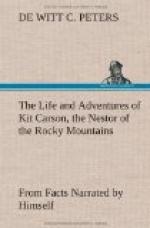The people, as a general thing, are quite poor, but,
as they find a ready market through the military posts
for their produce, they manage to realize some money,
and thus live quite comfortably, in contrast with
their former destitute condition under the government
of Old Mexico. Some of the inhabitants might be
said to be rich, though but few of this class own
ten thousand dollars’ worth of property.
It is with great labor that the people of Taos bring
their crops to perfection, as it is necessary to irrigate
the soil, unless the season, which is rarely the fact,
is favorable in furnishing rains to them. There
are no fences to divide one man’s possessions
from another’s; but, by common law, they furnish
shepherds to guard their flocks and cattle and keep
them from trespassing. The climate is very severe
during the winter season, but in the summer it is
delightful. The health of this community is wonderfully
good. Indeed, the only severe diseases they have
to contend against are brought on by vices. Excluding
small pox, and the lesser complaints among young children,
no epidemics are known. The country is so elevated
and inland, that the air is dry and salubrious, and
the “dew point” is rarely reached so as
to amount to anything. It may be well to add
here, that for the consumptive patient, in the early
stages of the disease, there is no such climate in
the world to visit, as that of New Mexico; but, as
a matter of course, he must vary his location with
the changes of temperature, being governed by the seasons.
The winter in Taos is too severe for him; then, he
must go South, towards, or even to El Paso, where
it is congenial to his disease. I prophesy that
some day our internal continent will be the “Mecca”
for pilgrims with this disease.
The dress of the New Mexican is the same as in Old
Mexico. The peasant wears his sombrero
and his everlasting blanket, which serves him as a
coat, and a covering by night. He rarely has but
one suit of clothes, which are put on new and worn
until they are of no further use. By amalgamating
with the Americans, they are gradually changing their
style of dress. The buckskin pants, which were
characteristically cut and ornamented, are giving way
to the ordinary cloth ones of his white companion.
It is so with the blanket, which is being shed for
the coat; and, again, this is true with the moccasin,
which is being replaced by the leathern shoe.
The dress of the female has undergone the same alteration.
From almost a state of nudity, they have been raised
to a position from which they look upon silk and satin
with a “connoisseur’s eye.”
When New Mexico was part and parcel of the domain
of Old Mexico, Taos was the seat of much smuggling
from the United States, and many an apparent pack of
grain drawn into the town has been nothing less than
packages of domestic goods, the duties upon which,
when introduced in the legal way, were enormous; hence
the white men engaged in this business, when successful,




